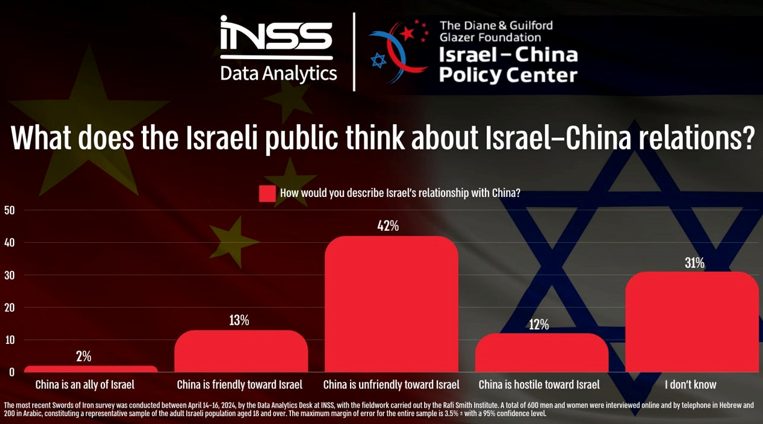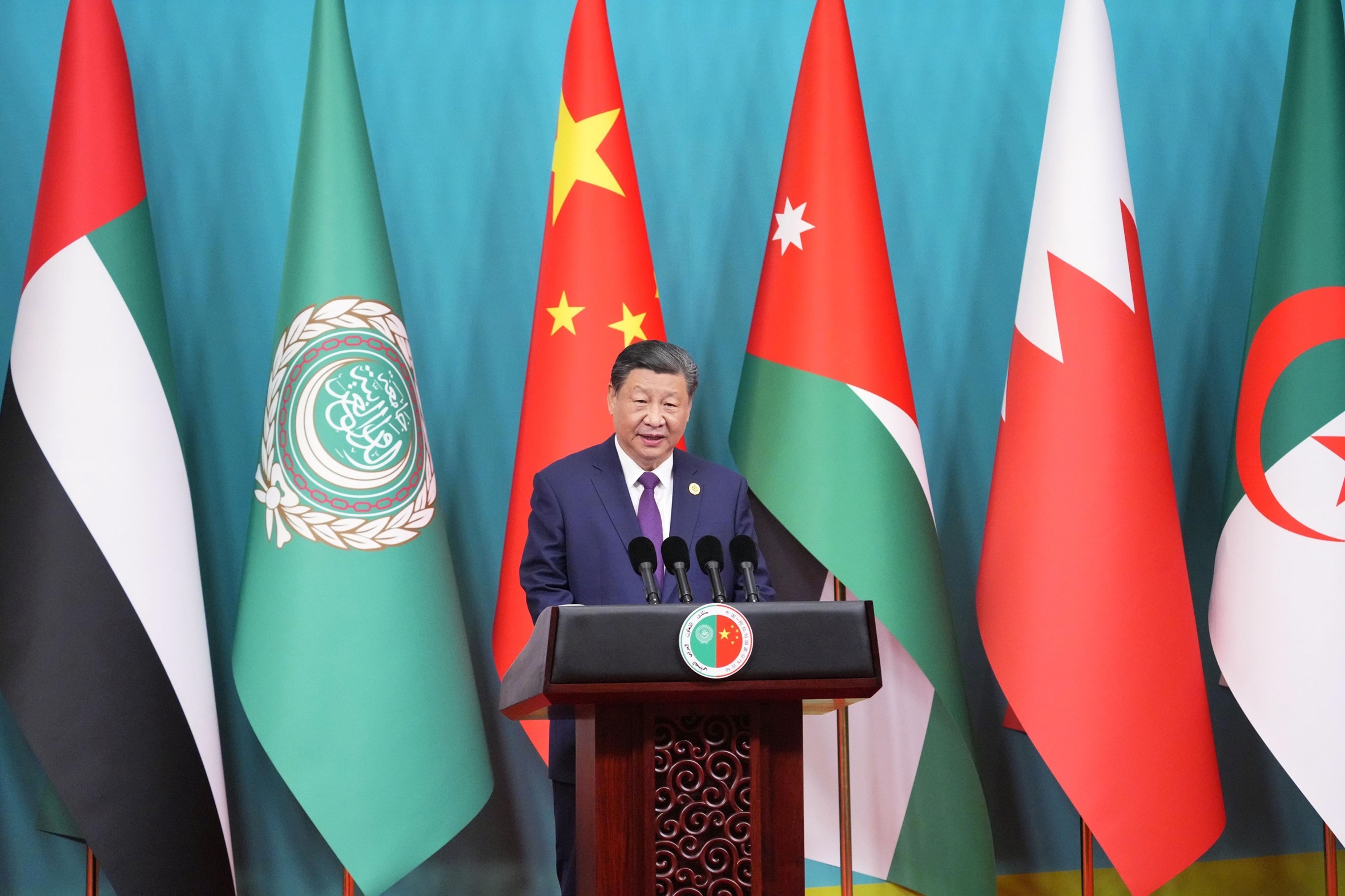Publications
INSS Insight No. 1877, July 9, 2024
The China–Arab States Cooperation Forum (CASCF) was held this year, marking the twentieth anniversary of its establishment. Over the years, the forum has become a platform for China to increase its influence over Arab countries at the expense of the United States and the West. However, it has also led to Arab countries influencing China to adopt increasingly extreme positions in the Israeli–Palestinian conflict. The joint statement this year, which was made in the midst of the war in the Gaza Strip, is the most hostile and one-sided toward Israel to date and represents the low point that China-Israel relations have reached. Even if it strains ties between the two nations, China might decide to “use Israel as a stick to beat America” as long as the Gaza War rages on and the rivalry between the superpowers grows. In order to address these negative trends, Israel needs to set clear boundaries with China behind closed doors and encourage direct and open communication with the Chinese leadership.
At the end of May, the 10th China–Arab States Cooperation Forum (CASCF) was held in Beijing. Since 2004, the forum has been held every two years, alternating between Beijing and an Arab capital, and attended by China’s foreign minister, the 22 member states of the Arab League, and the organization’s secretary. Concurrently, the king of Bahrain and the presidents of Egypt, Tunisia, and the United Arab Emirates paid state visits to China.
The war in the Gaza Strip was at the top of the agenda. In the opening speech, China’s President Xi Jinping called for an international peace conference to end the war and pledged that China would donate 500 million yuan and three million dollars (about NIS 267 million) to the Palestinians. The event concluded with three statements, two concerning the work of the forum, and the third addressing the “Palestinian issue.”
In this last statement, China and the Arab countries “condemn Israel’s aggression,” oppose the forced transfer of population, and demand that the Security Council force Israel to cease fire. The statement also condemns the United States, which vetoed Palestine’s bid for recognition as a state in the UN in April, and supports South Africa’s genocide case against Israel at the International Court of Justice (ICJ). Moreover, the statement states that “as the occupying power, Israel is responsible for the difficult humanitarian conditions in Gaza.” According to China and the Arab countries, the condition for regional peace and stability is “the cessation of the occupation of the territory of the State of Palestine whose capital is East Jerusalem, the occupied Syrian Golan Heights and the occupied Lebanese territories.” The parties also condemn the construction of Israeli “settlements” in Palestine and the Golan and call for the establishment of a Palestinian state on the 1967 borders with East Jerusalem as its capital, while recognizing the “right of return and reparation for the Palestinian refugees.”
It should be noted that the statement does not mention the October 7 terrorist invasion, the hostages held by Hamas, or the displaced Israelis; nor does it recognize the responsibility of Hamas and the Palestinians, or the attacks by Iran and its “axis of resistance” across the region. Hamas is only hinted at in the recognition of the Palestine Liberation Organization (PLO) as the sole political representative of the Palestinians and a call for all Palestinian factions to unite under its banner.
The Arab Lobby
China’s anti-Israel bias is not new. While its stated policy is to not take sides, in the Israeli–Palestinian conflict, “China always stood on the side of Arab and Muslim countries.” As far as Beijing is concerned, its support for the Palestinians reflects the international consensus and does not hinder economic cooperation with Israel. Beijing believes that these statements have no practical effect and that votes against Israel in the UN are thwarted by the American veto.
The Arab side is also responsible for China’s anti-Israel sentiment. This year’s CASCF commemorated the 20th anniversary of its founding. China had established similar forums with Central Asian countries and Russia (SCO), seven Portuguese-speaking countries (Macao Forum), and the African Union (FOCAC). Following CASCF, additional forums were established with the countries of Central and Eastern Europe (China-CEEC) and Latin America and the Caribbean (China-CELAC). What appears to be a Chinese initiative likely originated with the Arab League. The league wished to strengthen the coordination of its member states vis-à-vis the Chinese giant in matters of trade, investment, regional security, and politics. True to its United Front roots, the Chinese Communist Party has gradually co-opted the various forums and began to lead them as a main platform “for strategic guidance” in managing its relations in the different regions of the world.
Against the backdrop of the strategic rivalry between China and the West, which intensified with the Russian invasion of Ukraine, China adopted in 2023 the term “Global South” to describe those regions that include the Middle East and North Africa. In line with President Xi’s call to “seize control over the power of discourse” (“discourse power”), China appointed itself as the “voice of the global south,” and as standing by the Arab and Muslim world and a “coalition of the oppressed” by historical Western colonialism and hegemony. Meetings such as CASCF have become a central platform for marketing China as a “new type of major power.” Unlike the United States and European countries, China purports to have good relations with all parties in the region; it has never invaded other countries, does not interfere in the internal affairs and human rights of other countries, and provides economic opportunities “with no strings attached.”
Beijing’s desire for the Arab bloc to speak with one voice against Western hegemony presents a challenge, as it they are notoriously divided, reducing the Arab League to a contentious “talking shop.” Hence, the Palestinian issue serves as the lowest common denominator. As early as the 1950s, Beijing recognized Arab hostility to Israel as a means of winning friends and influence in its rivalry with the United States (and the Soviet Union). Although Israel and China established diplomatic relations in 1992, as long as the conflict remains unresolved, China wishes to carry on the tradition.
The Arab lobby, for its part, uses the CASCF to exert increasing pressure on Israel, with the forum’s biennial statements becoming more one-sided each time. Professor Dawn Murphy documented this development in her book, China’s Rise in the Global South. For example, in the third forum, held in 2008, a reference to the “ceasing of the occupation,” including in the Golan and Lebanon, was added for the first time; in 2010, despite Chinese concerns, the statement spoke of “settlements” in East Jerusalem; in 2012, support was added for Palestinian membership in the UN and UNESCO; and so on.
The latest statement, made on the 20th anniversary of the forum, is the most extreme so far. Given the nadir to which Israel has been pushed since the October 7 massacre and the attacks on it from seven fronts, it is also the most cynical.
Implications and Recommendations
The Chinese premise is wrong in two respects: First, regarding the resolution of the conflict, not only do the Hamas terrorists praise Beijing and benefit from the legitimacy that it provides, but even the “moderates” on the Palestinian side are hardening their positions. As Fatah Central Committee member Abbas Zaki, who is in charge of relations with Arab countries and China, stated in 2021, “China is going to lead the world.” Zaki believes that the emerging Chinese camp is on the Palestinian side: “If tomorrow we decide to be stubborn, and demand [a free Palestine] the [Jordan] River to the [Mediterranean] Sea [i.e., free of Israeli existence]—it would be fine with [the Chinese]. But they know us, and they know that we are not suicidal and that we want to make Israel swallow the poison one drop at a time.”
Second, the extensive economic interests that China has vis-à-vis Israel are also being tested. While CASCF was taking place, I visited Beijing as part of a delegation from the Diane and Guilford Glazer Israel-China Policy Center. During our visit, we met with research institutes, academics, and officials, and presented them the negative trends among the Israeli public toward China during the war. According to a 2019 Pew survey, Israel was ranked among the top five most pro-Chinese countries, with 66% of the public having a positive opinion and only 25% having a negative opinion. However, an INSS survey conducted in May shows that 42% of the Israeli public considers China to be unfriendly and 12% considers it to be hostile to Israel (see Figure 1). Only 15% of the Israeli public perceives China as a friendly country or an ally of Israel.

Upon hearing the data, the common message our interlocuters asked us to carry back to Israel is that China is “neutral” in the current war and remains interested in maintaining friendly constructive relations with Israel. Reading between the lines, it becomes clear that references to “neutrality” are not reflective of reality, but rather of China’s desire to avoid further damaging its relationship with Israel. Some noted that China’s position undermines the historical ties between the two nations. They pessimistically added that as the war continues and the rivalry with the United States escalates, Beijing will continue to “use Israel as a stick to beat the Americans,” much like “the United States uses Ukraine against China.”
Israel also has an interest in salvaging what it can from relations with the world’s second-largest economy, but that does not imply that it should readily accept its role as China’s battering ram. The first step in “building a foundation” under the spiraling relationship is for Israel to define its red lines, something China excels at when it comes to its “core interests.” Based on the experiences of other small countries, Israel should steer clear from confrontational actions that could surprise the Chinese or spark public disputes. It is possible that this is why Prime Minister Benjamin Netanyahu and Foreign Minister Israel Katz have yet to react in public to China’s anti-Israel stance since the beginning of the war. However, the fact that they have not yet publicly spoken with their Chinese counterparts is also not helpful. It is crucial that Chinese representatives visit Israel. Since the war began, only two midlevel Chinese officials have visited Israel, and according to our interlocutors in China, a “travel warning” issued by Beijing is preventing more Chinese government officials, scholars, and tourists from coming to Israel.
A phone conversation between Presidents Xi Jinping and Yitzhak Herzog, for example, in which they would present the two countries’ relations positively, call for the release of the hostages, and express empathy for the suffering of Israeli (and Palestinian) citizens, could help China’s standing in Israel without incurring any costs in the Muslim world. Furthermore, it would signal to China’s foreign and propaganda arms to temper their hostile approach toward the Jewish state.
The Middle East is at a crossroads: facing the threat of all-out war in Lebanon and regional chaos, or the prospect of Israeli–Saudi normalization and a prosperous security architecture of moderates against Iran’s “axis of resistance.” To preserve its relations with Israel, contribute to regional stability, and remain a relevant player in the “day after,” Beijing should prioritize direct communication with Israel over populist statements about it.



